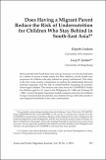Does having a migrant parent reduce the risk of undernutrition for children who stay behind in South-East Asia?
Abstract
Many parents from South-East Asia who go overseas to work are motivated by a desire to secure a better future for their children, yet the health consequences for children who stay behind are poorly understood. This study is the first cross-country comparison to explore the relationships between parental migration and the risk of undernutrition (stunting) for primary school-aged children. The analysis uses data from the CHAMPSEA project for children aged 9 to 11 years in the Philippines (N = 480) and Vietnam (N = 482). A series of logistic regression models compares outcomes for children living in transnational households and children living with both parents in non-migrant households in the same communities. We find no general advantage of having a migrant parent. Rather there is a reduced risk of stunting only for some left-behind children in the Philippines, whereas having a caregiver with low educational attainment is a major risk factor for all children. The findings point to a complex set of relationships between parental migration and child nutrition, possibly reflecting differential opportunities for accumulating household wealth through overseas earnings. Moreover, differences between the two countries caution against generalizing across national or cultural groups. We conclude by considering the implications of the findings for theories of transnationalism and for the UN Millennium Development Goal of reducing childhood undernutrition.
Citation
Graham , E & Jordan , L P 2013 , ' Does having a migrant parent reduce the risk of undernutrition for children who stay behind in South-East Asia? ' , Asian and Pacific Migration Journal , vol. 22 , no. 3 , pp. 315-347 .
Publication
Asian and Pacific Migration Journal
Status
Peer reviewed
ISSN
0117-1968Type
Journal article
Rights
Copyright © 2013 Asian and Pacific Migration Journal, published by Scalabrini Migration Center. This article is deposited by permission of the publisher.
Description
This article is part of a special issue which represents findings from a major research project investigating health and migrant parents in South-East Asia (CHAMPSEA). This research was funded by the Wellcome Trust [GR079946/B/06/Z and GR079946/Z/06/Z].Items in the St Andrews Research Repository are protected by copyright, with all rights reserved, unless otherwise indicated.

